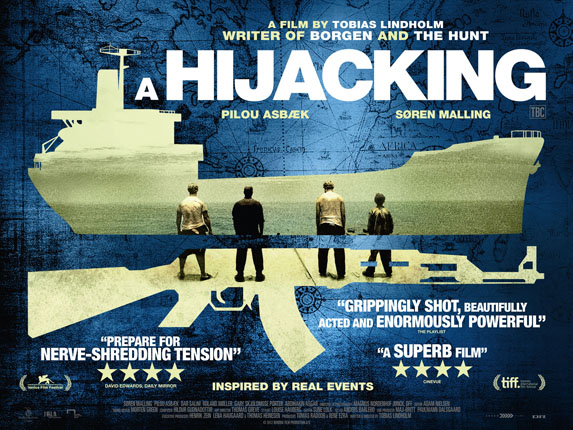Denmark has, in recent years, become the centre of dramatic revolution, with television series like The Killing and The Bridge wowing highbrow television viewers in ways that a British series hasn’t for a long time, while films like The Hunt and A Royal Affair have been taking some cinematic plaudits. The latest in this long line is A Hijacking, written and directed by Tobias Lindholm, the writer of both The Bridge and The Hunt. My own experience of these works is limited – I have seen The Killing and The Hunt but, thus far, have yet to catch up with the others. For me A Hijacking is more successful than the previous ventures I have seen.
The film tells the story of a ship bound for Mumbai being taken over by Somali pirates and the subsequent negotiation process for the safe release of both the ship and its 7 man crew. The story centres on two men, Mikkel, the cook on board the ship, and Peter, the CEO of the company which owns the vessel, and while there is undoubtedly tension built into the piece, that is not the central concern. Instead we focus on the emotional weight taken on by both men. Mikkel is selected by Omar, the designated ‘negotiator’ (he claims not to be one of the pirates, just a middle man), for the role of the emotional blackmail to be used in during the ransom negotiations, attempting to break the man in order to force the hand of the ship’s owners.
We are introduced to Peter taking part in a different kind of negotiation, a multi-million dollar deal with some Japanese business men, talking them down to an acceptable number when his minions were failing. It is his belief that he is cut out for exactly this kind of role and that is why he rejects the advice of the expert in the these situations, Connor Julian (Gary Skjoldmose Porter – someone who I felt I recognised, but who has no other credits), and decides to lead the negotiations with the pirates himself.
Peter is warned specifically that he cannot get emotional, that these negotiations will take a lot of time, and that there is a way to do things. He is also warned that the process could be very debilitating. Peter, though, is over confident in his abilities and takes on the mantel.
The film’s success is in the fact that it follows the natural course of events and doesn’t try to force anything. Lindholm understands there is enough drama in the story and he doesn’t need to Hollywood-ise it by turning it into an Under Siege scenario. We learn how the pirates manipulate circumstances to force the hand of those they are talking to, and we see how their games way heavy on everyone involved. The film is perfectly paced, nothing extraneous makes its way in, and nothing is left out. It is appropriately lean and all the more riveting for it.
Bringing it back to those Danish imports I have seen, it avoids their failings. The Killing was let down by the demands of the format. With so much time to fill, the story wondered up paths that made little sense and should have been seized upon in the reviews. The Hunt, on the other hand, tried something much more in line with A Hijacking, telling the story of a man falsely accused of sexual assault by a child. It was largely a success, again focusing on the emotions and characters, but was let down, for me, by the procedural elements – there were processes you expected to be followed that weren’t. It remained a solid piece of work though, anchored by a great performance from Mads Mikkelsen (currently playing Hannibal Lector in the magnificent TV series Hannibal).
A Hijacking felt genuine throughout, with no detail feeling out of place or untrue, and while enjoyable is probably the wrong word for a drama like this, it is a top quality dramatic work.
A-
NB – as so many films are clocking in well over 2 hours these days, completely unnecessarily, I am going to start adding the film’s run time, and how long it felt like to me, at the end of my reviews.
Length: 1hr 39mins – Felt like: 1hr 39mins

One Comment